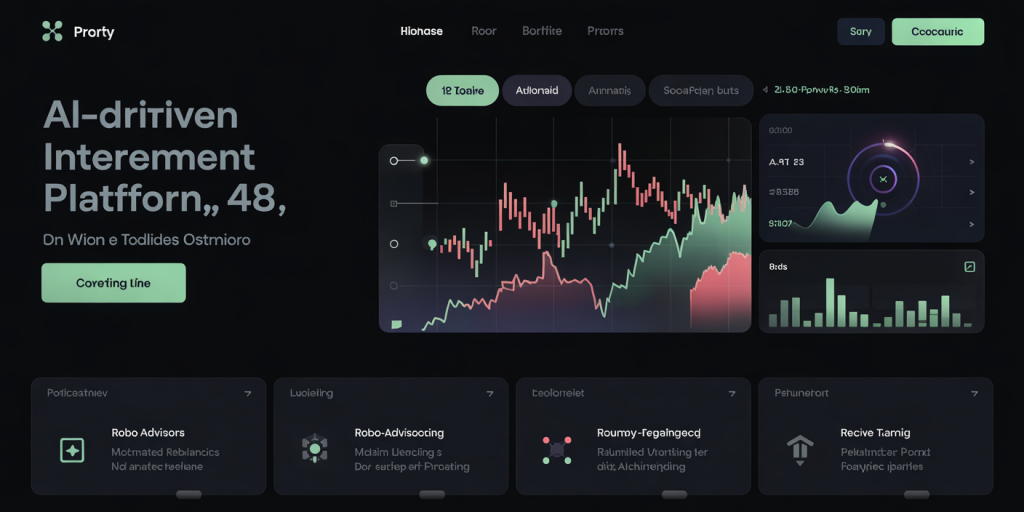AI Tools That Can Help You Make Smarter Financial Decisions
In today’s fast-paced financial landscape, making well-informed decisions is more critical than ever. The advent of Artificial Intelligence (AI) has transformed various industries, including finance, by offering sophisticated, data-driven tools that empower individuals and businesses alike. From personalized budgeting apps to advanced investment analytics, AI tools improve accuracy, efficiency, and insight, enabling smarter financial choices. This article explores how AI technology is reshaping financial decision-making, presenting practical examples and comparing prominent tools to guide you toward better money management.
The Transformative Impact of AI in Financial Decision Making
Artificial Intelligence has permeated the world of finance by providing capabilities that far exceed traditional methods. Leveraging machine learning algorithms, natural language processing, and big data analytics, AI enables predictive modeling and automation of complex tasks that traditionally required human expertise. According to a report by Deloitte, 62% of surveyed financial institutions indicated AI as a top priority for enhancing decision-making and operational efficiency in 2023.
At the personal finance level, AI-driven tools analyze spending habits, forecast future expenses, and detect opportunities for savings or investments. Notably, AI algorithms learn continuously from user behavior to refine recommendations and strategies, making the tools increasingly personalized and effective. This deep integration of AI enhances financial literacy and reduces the uncertainty often associated with money management.
AI-Powered Budgeting and Expense Management Apps
One of the most accessible ways AI aids financial decisions is through budgeting and expense tracking applications. Tools like Mint, You Need A Budget (YNAB), and PocketGuard utilize AI to categorize spending automatically, monitor cash flow in real-time, and offer customized advice for saving money or cutting costs.
For instance, Mint uses predictive AI to alert users about upcoming bills or unusual spending patterns, preventing overdrafts or late fees. In a practical scenario, a user who regularly spends excessively on dining out can receive targeted suggestions to set spending limits or switch to more affordable alternatives. According to a 2023 NerdWallet survey, 48% of users reported that AI-powered budgeting apps significantly improved their saving habits over six months.
The AI algorithms in these apps also provide behavioral nudges. By analyzing historical data, PocketGuard, for example, forecasts when an individual is at risk of overspending and proactively coaches them to adjust their budget. These personalized nudges have proven effective; Barclays’ 2022 financial wellness study found that users of AI budgeting tools reduced discretionary spending by up to 20% within the first quarter of use.
| Feature | Mint | YNAB | PocketGuard |
|---|---|---|---|
| AI-Based Expense Categorization | Yes | Yes | Yes |
| Predictive Bill Alerts | Yes | Limited | Yes |
| Personalized Saving Tips | Yes | Yes | Yes |
| Real-time Cash Flow Tracking | Yes | Yes | Yes |
| Behavioral Nudges | Moderate | High | High |
Investment Platforms with AI-Driven Analytics

AI’s role in investment strategy formulation has grown rapidly, with applications spanning robo-advisors to sentiment analysis tools. Platforms such as Betterment, Wealthfront, and Trade Ideas employ AI and machine learning to analyze market trends, optimize asset allocation, and automate portfolio rebalancing.

Betterment uses AI to tailor asset allocation based on individual risk tolerance and financial goals, periodically adjusting portfolios to maximize returns while minimizing risk. Real-world adoption shows positive outcomes; a 2023 study by the Journal of Investment Management found robo-advisors outperform traditional advisors by approximately 15% in portfolio returns over a five-year span, primarily due to AI efficiency and emotion-free decisions.
Trade Ideas leverages AI-powered algorithms to scan millions of data points across stock exchanges and provide actionable real-time trading alerts. For example, during volatile market conditions like those seen in early 2022, AI generated insights helped traders reduce losses by quickly identifying profitable sectors and avoiding risky assets.
Comparing these platforms reveals distinct strengths: Betterment and Wealthfront excel in long-term, goal-oriented investment strategies through automated and adaptive advice, while Trade Ideas suits active traders who need AI-driven signals for short-term decisions.
| Platform | Strategy Focus | AI Functionality | Ideal User |
|---|---|---|---|
| Betterment | Long-term investing | Risk-based portfolio optimization | Passive investors |
| Wealthfront | Goal-oriented growth | Tax-loss harvesting, automated rebalancing | Retirement savers |
| Trade Ideas | Active trading | Real-time market scanning and alerts | Day traders |
AI for Credit Risk Assessment and Loan Management
Banks and lenders increasingly rely on AI to assess credit risk and streamline loan processes, directly benefiting consumers through fairer interest rates and faster approvals. Companies like Upstart and Zest AI use AI algorithms to evaluate non-traditional data points such as education, employment history, and even online behavior to determine creditworthiness.

Upstart reported that its AI models reduced loan default rates by up to 75% compared to traditional credit scoring systems, vastly improving risk evaluation accuracy. This means potential borrowers with thin credit files or non-traditional income sources have better chances of approval and favorable rates, thereby promoting financial inclusion.
Beyond approval, AI helps borrowers manage their loans more effectively. For instance, AI-driven chatbot assistants provide personalized repayment plans and reminders, helping users avoid missed payments or defaults. This proactive approach supports financial health and reflects a shift from punitive to supportive credit management.
AI Tools Enhancing Tax Optimization and Planning
Tax planning can be complex and confusing, but AI tools simplify this by automating calculations, identifying deductions, and projecting tax liabilities. Platforms like TurboTax Live and H&R Block’s AI software integrate AI to analyze vast tax regulations and personal financial data to optimize filings.
TurboTax Live uses AI to guide users through interview-style questioning, detecting overlooked deductions or credits based on user responses and financial documents. For example, freelancers and small business owners receive customized suggestions to reduce taxable income legally, thereby maximizing refunds or minimizing dues.
Additionally, AI models simulate various tax scenarios, enabling proactive planning rather than reactive filing. This forward-looking approach allows individuals and businesses to adjust spending or income timing before year-end to optimize tax positions. According to IRS data, early tax planning can reduce liabilities by 5% to 10%, translating into substantial savings over time.
Future Perspectives: AI’s Evolving Role in Financial Decision Making
Looking ahead, AI is poised to play an even more integral role in financial decision-making across both personal and institutional contexts. Advances in deep learning and natural language understanding will enhance AI’s ability to interpret complex financial documents, market sentiment from social media, and geopolitical events, turning previously inaccessible data into actionable insights.
One emerging trend is the integration of AI with blockchain technology to create transparent, immutable financial advice platforms. Such innovations could reduce fraud, increase user trust, and foster more ethical financial practices.
Moreover, AI-powered financial coaching combining emotional intelligence with data analytics may revolutionize behavioral finance. By understanding the psychological drivers behind spending and investing, future AI tools could offer holistic guidance that not only improves finances but also promotes well-being.
As AI technologies become more ubiquitous, regulatory frameworks will adapt to ensure data privacy and ethical use, potentially unlocking broader adoption and innovation. The continuous evolution of AI tools guarantees a future where making smarter financial decisions becomes accessible, efficient, and personalized for everyone.
—
With AI reshaping how finances are managed, this technology offers unprecedented possibilities for improved financial literacy, risk management, and wealth growth. Armed with increasingly sophisticated AI tools, individuals and institutions alike can navigate complex financial landscapes with greater confidence and success.
